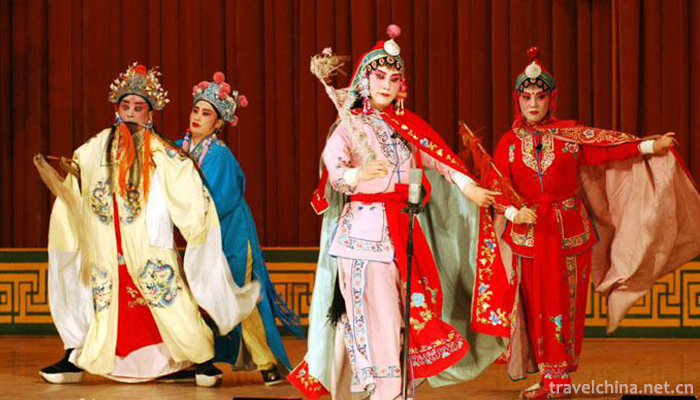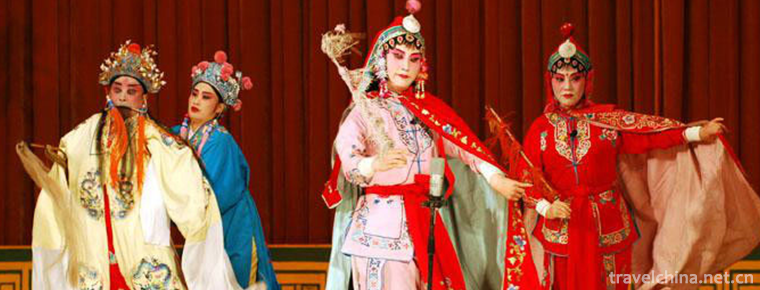Mao Qiang
Mao Qiang
Maoqiang, a local traditional drama in Gaomi City and Jiaozhou City, Shandong Province, is one of the national intangible cultural heritage.
Maoqiang is a local opera popular in Weifang, Qingdao, Rizhao and other places. It was originally a folk humming tune called "Zhou Gu Tune". Legend has it that Maoqiang was named after a nun who sang for a week, also known as "elbow drum". It is also called "oh ho ho ho ho ho" or "old turning tune" because of its unique features at the end of the last sentence and the last sentence. Around 1895, the northern Jiangsu people "Lao Man Zhou" and their children sang along Linyi to the north, merging the Liuqin opera singing tune into the "Ben elbow drum", forming a new singing method with the end tone raised by eight degrees. This kind of singing is called "knock off" or "knock out" by the local people. With its homophonic tone, "Ben elbow drum" gradually evolved into "Mao elbow drum", which was named after liberation. Maoqiang tune is simple and natural, euphemistic and quiet, easy to understand, and the female tune in Maoqiang is particularly developed, giving people a sense of sadness and sorrow.
In 2006, Maoqiang was approved by the State Council of the People's Republic of China to be included in the first batch of national intangible cultural heritage lists, with the heritage number IV-67.
historical origin
origin
Jiaonan is one of the main birthplaces of Maoqiang. According to the records of Jiaonan County, Maoqiang originated from the "girl's tune" and "elbow drum" in the middle of Ming Dynasty. Around 1800, folk artists absorbed the advantages of elbow drum from all over the country, blended into the local folk minor "old turning tune", and formed the "Ben elbow drum" with local characteristics. During the reign of Xianfeng and Tongzhi in Qing Dynasty, the combination of "Benelbow Drum" and "Haimao Tune" in northern Jiangsu formed a new singing method, which was called "Mao elbow Drum".
Development
After 1900, "Mao elbow drum" artists constantly absorbed the skills and repertoires of brothers'operas, especially Bangzi and Peking Opera (then known as "Pihuang"), and replaced Liuyeqin with Jinghu in Mao Shi drum accompaniment. So far, Maojiu Drum has developed into an independent folk singing form with traditional, national and local characteristics, active in Shandong Peninsula, and gradually expanded to Liaoning, Jiangsu and other provinces.
After the 1920s, Jiaonan Maoqiang has gained unprecedented popularity and development. After the founding of New China, it was officially named Maoqiang. According to county records, around 1955, 218 village-run amateur leagues in Jiaonan County were active in the vast rural areas all the year round. In the early 1960s, Maoqiang Opera Troupe of Jiaonan County, with Wang Xianmei, Chen Yanqin and Liu Guiying as its main actors, performed more than 300 performances a year, and turned to Jiaodong Peninsula and surrounding counties and cities. After the 1980s, a group of outstanding young and middle-aged actors, such as Wang Shuxian, Ding Senju, Yin Aihua and Wang Benhong, emerged. They innovated and developed Maoqiang's singing and music, and formed their own distinct and unique singing art style.
Cultural characteristics
Qu card
Most of them were transplanted from Bangzi and Peking Opera, and all kinds of positive and negative modes were basically complete. They also created "Four Unlike" and "Little Birth Doll" and other music cards.
Performing business
Maoqiang did not have actresses in its early stage, and entered the stage of Mao (Mao) elbow drum. It absorbed actresses. Later, it gradually developed into the stage of both civil and military operas. It was born, dan, Jing, end and ugly, with a complete range of acts and both civil and military operas.
Accent
Maoqiang tune is simple and natural, euphemistic and quiet, and easy to understand. It is deeply loved by the residents of Shandong Peninsula. Maoqiang women's tune is particularly developed, giving people a sense of sadness and grief, which can most arouse women's resonance, so Maoqiang is commonly known as "wife tied play".
Accompaniment instrument
Maoqiang was accompanied by percussion music such as drums, cymbals and gongs in the period of this elbow drum. Liuqin accompaniment was used in the period of Maojiu drum. Affected by Peking Opera and Bangzi, Beijing Hu was adopted as the main musical instrument, and the second reed of Peking Opera was fixed according to the strings. With Erhu and Yueqin, Suona, flute, Sheng, Low Hu and Yangqin were added one after another.
Suit and business
In terms of behavior, Maoqiang was only born, Dan and ugly at first. Later, according to Peking Opera industry, Maoqiang was divided into different roles, and its division of labor was more detailed and complete.
Representative repertoire
Maoqiang has more than one hundred plays, among which the representative plays are "Tokyo", "Xijing", "Nanjing", "Beijing", "Luoshi", "Five Cups", "Kite", "Keys", "Fire Dragon", "Silk Orchid", "Velvet" and "Bee" and so on.
Inheritance and protection
Inheritance value
First, Maoqiang, as a local opera, has been in prosperity for hundreds of years and deeply rooted in the masses of the people. It has strong appeal and vitality.
2. Maoqiang originated in the countryside and developed from folk minor. Its lyrics are simple and easy to understand and plain. Its singing style is simple and graceful, friendly and moving, and its female accent is developed, giving people a sense of sadness and sorrow. It can most arouse women's sympathy and is deeply loved by women. Therefore, there is the saying of "embedding their wives in the courtyard". Maoqiang's melody and rhythm are straight, very in line with the local dialect habits, easy to understand, easy to learn and sing, men, women, young and old can sing a few sentences, its strong local flavor, can communicate with the audience with sorrow, joy, and feeling cordial. So it can be passed on.
Thirdly, Maoqiang Opera has distinct regional characteristics, which are well-known to the audience as folk customs, strict opera programming, unique performance characteristics, direct expression of public opinion, different musical styles and rich compatibility characteristics.
Inheritance status
Maoqiang has strong artistic appeal and vitality, and is closely related to people's life. However, with the development of market economy and modern science and technology, people's way of life and art appreciation have changed greatly. The young people in the city are relatively unfamiliar with Maoqiang, and the professional performing team is shrinking. Although Maoqiang has a strong mass base in the countryside at present, the problems of its development and inheritance are equally serious.
Inheriting characters
Zeng Jinfeng, female, Han nationality, born in 1931 in Jiaozhou, Shandong Province. In 2007, Maoqiang was selected as the representative successor of the second batch of national intangible cultural heritage projects and the first-class actors.
protective measures
In 2008, Gaomi City entrusted Weifang College's Teachers'College of Preschool Education to set up Gaomi Maoqiang Junior Class, which enrolled 40 students. Now these students have been accepted by Gaomi Art Theater and become the main performing force of the theatre.
social influence
Honorary commendation
In September 1956, at the Second Opera Visiting and Performing Conference of Shandong Province, the Qingdao delegation performed the traditional opera "Luo Shi Ji". The Changwei delegation performed the traditional opera "Zhang Lang divorced his wife" and the modern opera "Mind Your Eyes". Liu Shunxian (Mammy Yao in Luo Shi Ji) won the old artist award. Zeng Jinfeng and Li Lanxiang won the first Prize for actors.
During the Shandong Drama Performance Month in 1982, the Maoqiang Opera Troupe of Jiaoxian, Qingdao, participated in the performance of Yan Shuangfei, and won the Drama Creation Award, the Excellent Director Award, the Music Design Award, the Excellent Dance Design Award, the Lighting Design Award and the Costume Design Award. Zeng Jinfeng, Zhang Minghua and Kuang Guodong won the Excellent Performance Award and Zhang Meixiang won the Performance Award.
social activities
In 2014, Gaomi Art Theatre created Maoqiang Opera "Red Sorghum" adapted from Mo Yan's novel of the same name.
In May 2018, the launch conference of CCTV documentary series "Jiaozhou Maoqiang and Jiaozhou Yangge" was held in Dongxiaotun Village, Jiaozhou City, Qingdao City, Shandong Province.


-
2.Quyuan Hometown Tourist Area
The cultural tourist area of Quyuan's hometown is located in Fenghuangshan, Zigui County, Yichang City, with a total area of 33.3 hectares in the north, Gaoxia Pinghu Lake in the north
Time 2018-12-12 -
3.Hushan Great Wall
Hushan Great Wall is situated on the Yalu River, 15 kilometers east of Dandong City. It is an important scenic spot in the national Yalu River scenic spot. It is across the river from Korea's Yuchidao
Time 2019-01-16 -
4.Qinghai Provincial Museum
Qinghai Museum is located in the east of Xining Square in the west of Xining City. It is the first large-scale comprehensive museum with modern functions in Qinghai
Time 2019-02-07 -
5.Cloth paste painting
Teng Teng is the founder of Teng's cloth paste painting. He was born in Fengning Manchu Autonomous County, Hebei Province in 1932. He is the director of Teng's cloth paste painting
Time 2019-04-04 -
6.Jamal
In June 2008, Chamane declared by Alxa League of Mongolian Autonomous Region was listed in the second batch of national intangible cultural heritage list with the approval of the State Council.
Time 2019-04-15 -
7.Fengyang folk songs
Fengyang folk song is a traditional folk song in Anhui Province. Fengyang folk song in Fengyang flower drum is one of the important components of Fengyang folk song
Time 2019-04-29 -
8.Ha Ni Ha Ba
Ha Ni Ha Ba, an important part of Chinese Hani folk literature. Hani Haba, which means Hani ancient songs, is a popular and far-reaching folk song in Hani social life.
Time 2019-05-02 -
9.Sichuan Yangqin
Sichuan Yangqin is one of the representative folk songs of Sichuan Province, which is popular in Chengdu, Chongqing, Luzhou, Zigong and other cities and regions. In the early period, it was also calle
Time 2019-06-16 -
10.Yucun drum car
Yucun Drum Car has a history of more than 2,700 years. It has recovered after a long history of ups and downs. Drum truck is a combination of drum and car, which evolved from the ancient chariot. As a
Time 2019-06-28 -
11.Panzhihuas primary industry
In 2018, the total output value of agriculture, forestry, animal husbandry and fishery in Panzhihua was 7.027 billion yuan, an increase of 4.2%. Among them, agricultural output value was 4.434 billion yuan, an increase of 5.2%; forestry output value was 108 million yuan, an increase
Time 2020-12-14 -
12.Yibin local specialty
The production of bamboo spring, bamboo carving and bamboo weaving in Yibin city began in Yuan and Ming Dynasty, with excellent materials and local characteristics and life interests. Therefore, he became famous both at home and abroad and entered the court many times.
Time 2020-12-18